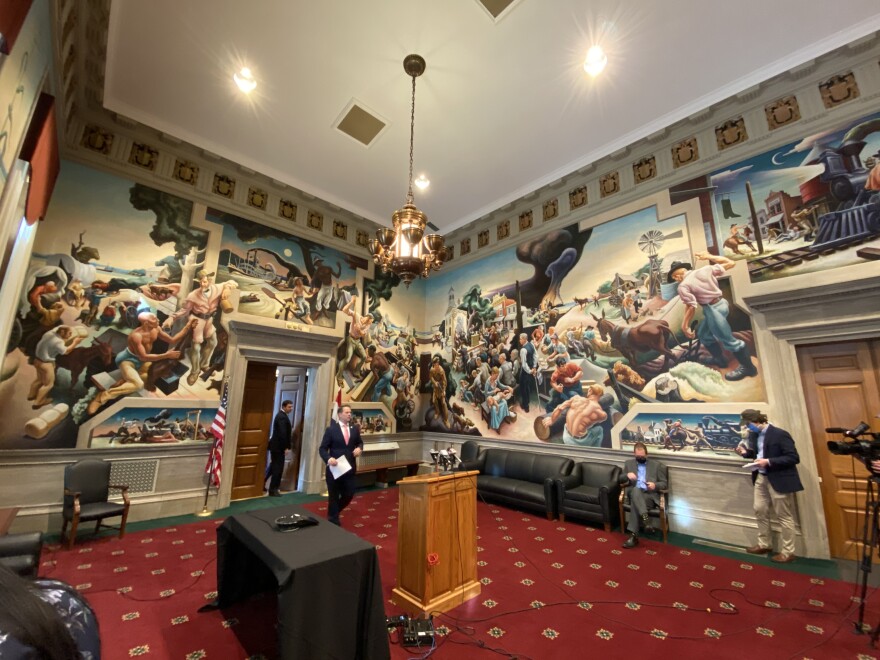Missouri lawmakers capped an unprecedented 2020 legislative session by expanding access to absentee ballots during a pandemic and passing a wide-ranging crime bill — even as other priorities failed to get final approval.
And while the session featured some major budget moves aimed at combating the coronavirus, lawmakers from both parties expressed frustration about missed opportunities — and how the legislative process unfolded.
Just before adjourning, the General Assembly passed legislation creating a pathway for people to cast absentee ballots in the midst of the pandemic. Sen. Dan Hegeman’s bill would allow people who are at risk, including those over 65 or who have serious health conditions, to request and cast an absentee ballot without a notary.
Anyone else who wants to cast a ballot by mail due to fears of contracting COVID-19 can do so — but the person would have to get the ballot notarized. If Parson signs the bill, the rules would cover the upcoming August and November elections.
Some election officials had been pushing for the Legislature to provide rules so voters could request an absentee ballot because of coronavirus fears. They cited widespread concern from voters about going to crowded polling places.
“It’s all about the compromise,” said Rep. Peggy McGaugh, R-Carrollton. “I think everyone can go home and tell their constituents that their fear of contracting the disease is alleviated by what we did.”
But the bill that was sent to Parson drew criticism from both sides of the political spectrum.
Secretary of State Jay Ashcroft, a Republican, sent out a statement before the House approved it calling for lawmakers to vote the measure down. He supported another bill that required all voters who request an absentee ballot because of COVID-19 to have their ballots notarized.
“No bill at all is better than passing bad legislation with permanent consequences,” Ashcroft said.
Some Democrats contended that the notary requirement for those mailing in a ballot because they don’t want to contract the coronavirus defeated the purpose of the proposal. While calling on Parson to sign the measure, state Auditor Nicole Galloway said in a statement that “the next step should be the elimination of the excuse and notary requirements entirely.”
“Missouri is one of only 11 states that requires voters to access a notary in order to vote absentee,” said Galloway, who is seeking the Democratic nomination for governor. “The notary requirement is not essential to election security as we have seen in 39 other states. Missouri should adopt policies that allow any registered voter to vote absentee by mail without providing an excuse and without having to obtain a notary seal.”
Crime bill approved

The House also gave final approval to Sen. Tony Luetkemeyer's wide-ranging crime bill. It creates the offense of vehicle hijacking, changes the penaltyfor armed criminal action, defines street gangs and takes away the possibility of probation or supervised release for a host of violent felonies.
House Speaker Elijah Haahr, R-Springfield, said the legislation was a priority for House and Senate lawmakers who wanted to get a handle on a rise in violent crime in St. Louis, Kansas City and Springfield. He said it didn’t contradict efforts from 2019 to reduce mandatory minimum sentences as part of a criminal justice overhaul.
“There are ways we can rehabilitate and return those people to being productive members of our society,” Haahr said. “But we obviously have a problem … in St. Louis, Kansas City and Springfield that we need to be focused on. And that's the dichotomy we face. And that’s how these two pieces of legislation dovetail.”
The bill did not include eliminating the residency requirement for police officers in St. Louis, which both the mayor and police chief supported to help with recruiting.
Prescription drug monitoring falters

One bill that failed to get final approval was a prescription drug monitoring program, which is aimed at stopping opioid abuse. It was shelved after several Republican senators engaged in a mini-filibuster on Friday objecting to how the Missouri House wanted changes after the Senate approved a compromise version earlier this year.
A number of GOP lawmakers have opposed the prescription drug monitoring program for years based on fears that it infringes on people’s privacy.
“Here we are in the midst of a global pandemic,” said Sen. Bill Eigel, R-St. Charles County. “And for the past three weeks, this chamber, along with our colleagues across the rotunda, have done everything we could to squeeze legislation that will add new government into the lives of our citizens.”
Among other things, Luetkemeyer’s bill that passed out of the Senate created a board of physicians and pharmacists that ran the database. In the original version of the bill, the Department of Health and Senior Services would have been in control of the database.
Senate Majority Leader Caleb Rowden, R-Columbia, said that there was “heartburn” among Senate Republican leadership that they couldn’t get the program across the finish line. Missouri is the only state in the nation without a statewide prescription drug monitoring program, though most of the state is now linked up with St. Louis County’s database.
“The nature of the last three weeks coming back in the way that we did — there’s always the inevitability of various pieces of high-profile legislation getting leveraged against each other,” Rowden said. “And PDMP always falls into that category. We’re going to have to find a way to get it done. It is more than past time to check this box.”
Strange session

Friday marked the end of one of the most unusual sessions in Missouri history.
Lawmakers were away from Jefferson City for more than a month because of fears of contracting the coronavirus. And that likely doomed items that were priorities at the beginning of the session, such as regulating gaming machines in places like gas stations, legalizing sports betting and taxing online purchases.
Coronavirus also changed how the Legislature acted. Many members spoke on the House or Senate floor wearing masks. And because of the truncated time frame, legislators had to stuff multiple ideas into large “omnibus” bills that were often hundreds of pages long.
“These omnibus bills were all pushed together. And we couldn’t even consume them or read them or wrap our heads around them,” said Rep. Donna Baringer, D-St. Louis. “And so where we should have been concentrating, we did not.”
Gov. Mike Parson said on Thursday that lawmakers were able to accomplish plenty under difficult circumstances.
“COVID-19 especially changed this year’s legislative session,” Parson said. “This session started with a lot of hope. As you all remember in January, we were looking at one of the strongest economies we’d ever seen. And then all of a sudden, you know where we’re at today.”
While not committing to calling a special session, many Republican and Democratic lawmakers say they expect to come back soon — especially if Congress passes a bill allocating money to help state and local governments with budget shortfalls. Lawmakers earlier approved legislation authorizing Parson to spend up to $6 billion to fight coronavirus, which was largely federal money.
“We had a constitutional deadline of May 8 to get a budget done,” Haahr said. “We met that deadline. But because we delayed our income tax filings til mid-July, it’s really hard for us to make a calculated decision on what that budget number would look like by the time we got to that date. So I think it’s possible we come back on a budget situation.”
Rep. Kip Kendrick, D-Columbia, said federal money will be critical to prevent Parson from having towithhold funding — which could affect money going to K-12 schools and colleges and other state government services.
He also bristled at some Republican calls for Congress not to send money to state and local governments.
“If we’re going to play this game of political posturing, then tell them to send the money back. Don’t take any of the federal money,” Kendrick said. “If there’s going to be this calling that we don’t need the money, then send it back and make the cuts across the board — and put this state in a horrible position moving forward.”
Follow Jason on Twitter: @jrosenbaum
Follow Jaclyn on Twitter: @DriscollNPR
Send questions and comments about this story to feedback@stlpublicradio.org







